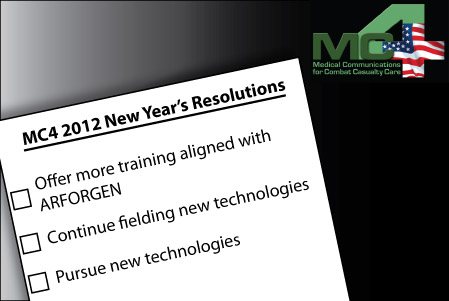Since millions of people a year make outlandish resolutions they never intend to meet, why can't I? Actually, I'm not shy to brag that we met many of our resolutions from last year and we’re looking to build upon them in 2012. Here’s what we have in store for the new year, at a glance:

Offer more training that aligns with the Army Force Generation (ARFORGEN) Cycle
Over the past few months, we've made significant progress in institutionalizing MC4, that is, in Army-speak, getting MC4 training engrained in school houses at the ground level. Last year we got our foot in the door at the CONUS Replacement Center (CRC) and expanded training at the Army Medical Department Center and School (AMEDDC&S), but we want to institutionalize MC4 in other areas so we can continue to assist with unit readiness. Step one was to publish our MC4 Training Strategy and then create this flashy graphic to show we're lining up the strategy with the Army Force Generation (ARFORGEN) framework. Now it's time to execute the tactics.
Continue fielding new technologies
Telehealth is a proven and hot commodity that deserves to be explored further. Recently, we worked with the Telemedicine and Advanced Technology Research Center to expand the telehealth footprint in Afghanistan. In addition to bringing this capability to some types of deployed units as an enduring capability, we want to explore ways to provide high resolution cameras and other tools to health care providers and Soldiers to enhance the quality of virtual consultations.
Additionally, it's important we continue to field improvements to MC4 systems to help providers streamline patient care and manage medical supplies. We are still fielding EMR 2.1.3.1 and look to have that completed in early 2012. We'll also begin fielding a new version of Defense Medical Logistics Standard Support (DMLSS) to combat support hospitals and medical logistics companies in theater next month through the summer. This will enhance the capability of those units and provide them with improved medical maintenance and work order management processes. There will also be a new version of DMLSS Customer Assistance Module (DCAM) coming your way this year.
Pursue new technologies
We didn't make it into NIE 12.2, but we will try for participation in 13.1. We want to continue our Telehealth enduring capability efforts as well as stay on the Army's leading edge when it comes to mobile electronic devices (MEDs). As the Army moves forward with MEDs, we want AHLTA-Mobile and other medical applications on these devices as they are fielded to Soldiers. PEO Soldier is the Army lead for hand-held devices and we are participating in a number of forums to ensure medical requirements are met. Hands-free, point-of-injury and MEDEVAC documentation are still goals we are exploring.
The Army is hopefully months away from releasing a secure, battle-ready smartphone. We're looking forward to this announcement so we can field apps to connect remote customers to the MC4 system. Having the ability to access information on a mobile electronic device will improve point-of-injury documentation and open the door for us to explore other capabilities we can offer MC4 customers on the go.
The Commander's Guide to MC4 was updated and re-released in summer 2011 and is now available on ATN2GO and accessible to customers via their iPhone, iPod Touch, iPad or Android device. I encourage you to read the Commander's Guide blog series and provide feedback on what improvements you would like to see in future iterations of this resource. In the coming year we hope to repackage the guide so each annex can be downloaded or shared individually.
There are other initiatives we have planned for 2012, including enhancements to the MC4 garrison use support system within the continental United States. We will continue to mirror the MC4 support structure we have overseas and establish a similar framework stateside to assist units who use the EMR system. New capabilities and improvements in our exercise support simulation tools for the Medical Situational Awareness in the Theater (MSAT) will be rolled out during Key Resolve in Korea early this year.
Tell us what resolutions you’re committed to or recommend MC4 pursue this year!